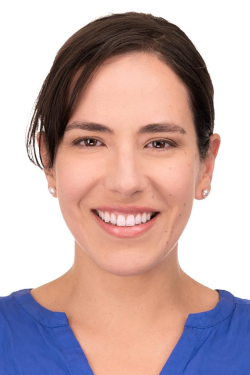Markita del Carpio Landry
2024 National Award Winner — Faculty

Current Position:
Associate Professor
Institution:
University of California, Berkeley
Discipline:
Chemical Engineering

Current Position:
Associate Professor
Institution:
University of California, Berkeley
Discipline:
Chemical Engineering
Recognized for:
The development of pioneering nanoscale chemical tools to address disparate challenges in human health and sustainability.
Areas of Research Interest and Expertise:
Nanobiotechnology, neuroscience, neurochemical imaging, plant biotechnology
Previous Positions:
BS, Chemistry, University of North Carolina at Chapel Hill
BA, Physics, University of North Carolina at Chapel Hill
Certificate, Business Administration, University of Illinois Urbana-Champaign
PhD, Chemical Physics, University of Illinois Urbana-Champaign (Advisor: Yann Chemla)
Postdoctoral Fellow, Chemical Engineering, Massachusetts Institute of Technology (Advisor: Michael Strano)
Assistant Professor, University of California, Berkeley
Faculty Scientist, Lawrence Berkeley National Laboratory (current)
Research Summary:
Chemical behavior at the smallest scales of biology still holds many secrets to how life operates. Markita del Carpio Landry, PhD, engineers these small-scale chemistries of life, using very small particles to uncover new insights and tools for biology. Landry has applied new nanobiotechnology towards a wide range of tasks, from measuring the transfer of chemicals between synapses in the brain to bioengineering plant genetics. Landry’s strategies for applying nanobiotechnology tools are already paving the way for more resilient crops and new treatments for neurological disease ranging from neurodegeneration to autism spectrum disorders.
“At their core, biological systems are simply a collection of tiny molecules that follow the rules of chemistry and physics. It is exciting to bring these rules to the study of life - from brain communication to the development of sustainable crops.”
Key Publications:
Other Honors:
2024 Society for Neuroscience Presidential Lecture, Society for Neuroscience
2023 Schmidt Polymaths Award, Schmidt Futures
2022 Vilcek Prize for Creative Promise in Biomedical Science, Vilcek Foundation
2022 McKnight Scholar Award, McKnight Foundation
2022 UNC Chapel Hill Distinguished Young Alumni Award, UNC Alumni Association
2021 Chan-Zuckerberg Biohub Investigator, Chan-Zuckerberg Initiative
2021 Dreyfus Foundation Teacher-Scholar Award, Dreyfus Foundation
2021 NSF CAREER Award, National Science Foundation
2020 University of Illinois Young Alumni Award, University of Illinois Alumni Association
2017 Beckman Foundation Young Investigator Award, Beckman Foundation
In the Media:
National Public Radio – Scientists Thread A Nano-Needle To Modify The Genes Of Plants
Popular Mechanics – An Advance in Bioengineering Could Pave the Way for Tomorrow’s Superplants
San Francisco Chronicle – Shedding light on how antidepressants affect the brain
Chemical and Engineering News – Carbon nanotubes deliver DNA into plant cells